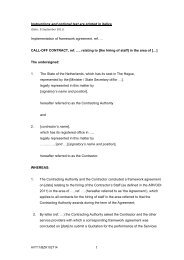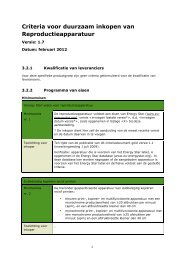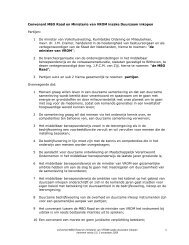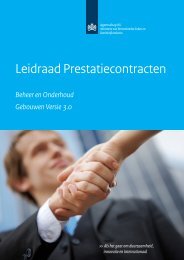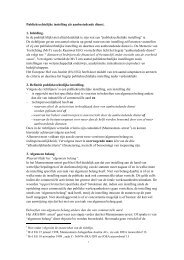Explanatory notes to ARVODI 2011 - Rijksoverheid.nl
Explanatory notes to ARVODI 2011 - Rijksoverheid.nl
Explanatory notes to ARVODI 2011 - Rijksoverheid.nl
Create successful ePaper yourself
Turn your PDF publications into a flip-book with our unique Google optimized e-Paper software.
<strong>Explana<strong>to</strong>ry</strong> <strong>notes</strong> <strong>to</strong> the General Government Terms and Conditions for PublicService Contracts <strong>2011</strong> (<strong>ARVODI</strong> <strong>2011</strong>)(Date: 7 June <strong>2011</strong>)Although these explana<strong>to</strong>ry <strong>notes</strong> are public, they are not part of the Contract. They may beused <strong>to</strong> dispel any doubts about the meaning or interpretation of the General GovernmentTerms and Conditions for Public Service Contracts <strong>2011</strong> (<strong>ARVODI</strong> <strong>2011</strong>). The <strong>notes</strong> do not,however, affect any agreements made by the Parties in a specific situation.1. General introduction1.1 Object of the <strong>ARVODI</strong> <strong>2011</strong>The General Government Terms and Conditions for Public Service Contracts (<strong>ARVODI</strong>)were first adopted by prime ministerial order of 5 March 2004. They provide a uniform,government-wide framework for public service contracts between the State of theNetherlands (i.e. all ministries and public authorities and agencies for which the ministriesare responsible) and third parties. When the General Government Terms and Conditions forPublic Service Contracts were revised for the second time (they are now referred <strong>to</strong> as the<strong>ARVODI</strong> <strong>2011</strong> <strong>to</strong> distinguish them from previous versions), it was also decided <strong>to</strong> revise theexplana<strong>to</strong>ry <strong>notes</strong>. For the sake of convenience, the <strong>ARVODI</strong> <strong>2011</strong> will be referred <strong>to</strong> inthese <strong>notes</strong> simply as the <strong>ARVODI</strong>.1.2 Changes in the <strong>2011</strong> version compared with the 2008 versionMost of the textual changes made <strong>to</strong> the <strong>ARVODI</strong> relate <strong>to</strong> assessment and acceptance(article 4), invoicing (article 14) and payment (article 15). The reviewers also looked ataspects such as clarity, use of language and consistency. As far as invoicing procedures areconcerned, it is worth bearing in mind that the <strong>ARVODI</strong> oblige the supplier <strong>to</strong> send anelectronic invoice. This clause is intended <strong>to</strong> support the central government policy onelectronic invoicing. The model contract contains an escape clause in case a supplier doesnot have access <strong>to</strong> the technology required <strong>to</strong> supply an electronic invoice.1.3 Use of the <strong>ARVODI</strong>The Contract signed by the Contracting Authority and the Contrac<strong>to</strong>r states that it isgoverned by the <strong>ARVODI</strong>. Model contracts have been drawn up for this purpose that are
available for use by civil servants. The models should be used as the basis for the draftcontract; the user will need <strong>to</strong> add details at various points.Both in the event of an award procedure and in the case of limited bidding, the governmentauthority in question should send a draft of the Contract, <strong>to</strong>gether with a copy of the <strong>ARVODI</strong>and the other tender documents, <strong>to</strong> the tenderers or candidates selected.1.4 Deviation from the <strong>ARVODI</strong>It is possible <strong>to</strong> deviate from the <strong>ARVODI</strong> in exceptional situations, although any suchdepartures must be guided by the relevant text of the explana<strong>to</strong>ry <strong>notes</strong> and the relevantmodel contracts.1.5 Scope of the <strong>ARVODI</strong>In principle, the <strong>ARVODI</strong> are designed <strong>to</strong> cover all types of Services. An exception is legalrelationships that are so specific as <strong>to</strong> warrant the use of different terms and conditions forthe contract in question. In such cases, you are advised <strong>to</strong> seek the advice of your own legaldepartment.An example of a highly specific legal relationship would be an IT contract. For this purposespecial terms and conditions have been drawn up, known as the General Government Termsand Conditions for IT Contracts (ARBIT), and there are specific model contracts.Work contracted <strong>to</strong> architects and engineering consultants is another example of a specifictype of relationship. For such situations, the Government Buildings Agency has its ownGeneral Provisions for Contracts Awarded <strong>to</strong> Architects and Consultants (ABAA DNR 2005),<strong>to</strong> be used in combination with the New Rules on the Legal Relationship between Clients andArchitects, Engineers and Consultants (DNR 2005).Should a basic set of different or supplementary terms and conditions be needed for certaintypes of contracts, a separate model contract will be drawn up for this purpose. To date, thishas been done o<strong>nl</strong>y for high-value research contracts (for which purpose a model researchcontract has been drawn up).
It goes without saying that purchases and deliveries of physical goods are covered by theGeneral Government Purchasing Conditions (ARIV).1.6 EvaluationIt is important <strong>to</strong> keep the <strong>ARVODI</strong> up <strong>to</strong> date and, where necessary, <strong>to</strong> adjust them <strong>to</strong> takeaccount of changes. For this reason, the <strong>ARVODI</strong> will be evaluated at regular intervals,based on users’ experiences. The current version is the result of a thorough reviewperformed by the interministerial Advisory Committee on Corporate Legal Affairs (CBA),which also examined aspects such as clarity, use of language and consistency. Commentsreceived from private-sec<strong>to</strong>r organisations were already taken in<strong>to</strong> account during a previousreview.However, it remains important <strong>to</strong> keep the <strong>ARVODI</strong> up <strong>to</strong> date and, where necessary, <strong>to</strong>make further adjustments <strong>to</strong> them based on users’ experiences. If you have any suggestionsor queries in this connection, please contact the secretariat of the CBA. This falls under theDirec<strong>to</strong>rate-General for Central Government Organisation and Operational Management(DGOBR) at the Ministry of the Interior and Kingdom Relations.2 Notes on individual articles2.1 Section I: General2.1.1 Definitions (article 1)Terms defined in article 1 of the <strong>ARVODI</strong> are consistently spelled with initial capitals. Thismeans that, whenever one of these terms appears in the <strong>ARVODI</strong>, its meaning is as definedin article 1. The same applies <strong>to</strong> the use of these terms in the model contracts.The term ‘Schedule’ is defined as a document attached <strong>to</strong> the Contract which, when initialledby the parties <strong>to</strong> the Contract, is considered <strong>to</strong> form an integral part of it. It is thereforeimportant <strong>to</strong> ensure that all schedules have been initialled by the Parties.The definition of ‘Contrac<strong>to</strong>r’s Staff’ implies that the term not o<strong>nl</strong>y covers staff employed bythe Contrac<strong>to</strong>r, but also applies <strong>to</strong> people engaged or deployed by the Contrac<strong>to</strong>r for the sole
purpose of performing the Contract. These are designated here as ‘assistants’ (see alsoarticle 5).The official public holidays as defined in the General Extension of Time Limits Act are: NewYear’s Day, Easter Monday, Whit Monday, Christmas Day, Boxing Day, Ascension Day, theday on which the monarch’s birthday is celebrated, and 5 May. Where a Contract is signedwith a foreign partner, it is worth making sure that there is no confusion about days classifiedas official public holidays, especially as the contractual partner may be used <strong>to</strong> other publicholidays.As the term ‘Party’ is used <strong>to</strong> refer <strong>to</strong> both the Contracting Authority and the Contrac<strong>to</strong>r, it isimportant <strong>to</strong> take careful account of the context in which the term is used.2.1.2 Applicability (article 2)O<strong>nl</strong>y the <strong>ARVODI</strong> apply <strong>to</strong> public service contracts, and not any terms and conditions theContrac<strong>to</strong>r may have drawn up. This is why the model contract explicitly excludes theapplicability of other general terms and conditions (see article 6.1 of the model contract). Seepoint 1.5 of the explana<strong>to</strong>ry <strong>notes</strong> for information on exceptions <strong>to</strong> this rule.2.2 Section II: Performance of the Contract2.2.1 Guarantees (article 3)Under article 3, the Contrac<strong>to</strong>r guarantees that the Services provided by it or on its behalfmeet the requirements laid down in the Contract and will be performed in a professionalmanner. It is important <strong>to</strong> note here that any failure <strong>to</strong> fulfil this guarantee au<strong>to</strong>maticallyconstitutes an attributable failure. The Contrac<strong>to</strong>r is obliged <strong>to</strong> pay for any loss or damageincurred as a result of its failure <strong>to</strong> fulfil the guarantee.2.2.2 Assessment and acceptance (article 4)The acceptance and assessment of the Services provided are important miles<strong>to</strong>nes in theperformance of a Contract. After all, these are the points at which you decide whether or notthe Contrac<strong>to</strong>r has discharged its contractual obligations. The reviewers spent a great deal oftime ensuring that this article is absolutely clear. This is why, for example, paragraph 2 states
what the Contracting Authority needs <strong>to</strong> do if it deems the services provided <strong>to</strong> beunsatisfac<strong>to</strong>ry. Article 4.5 explains the consequences if the Contracting Authority does notrespond by the time limit set in paragraph 1 (whether or not this has been extended). Such afailure <strong>to</strong> respond amounts <strong>to</strong> tacit acceptance.In assessing the Services provided, it is important <strong>to</strong> decide whether they have beenprovided in accordance with the description of the object of the Contract and with therequirements set out in it. If the Services meet these requirements, the Contracting Authorityhas <strong>to</strong> accept them. For example, the Contracting Authority is not at liberty <strong>to</strong> reject theServices merely on the grounds that it does not agree with the conclusions drawn in a report,or that it does not like the tenor of a report compiled by an independent audi<strong>to</strong>r.Once the Services have been accepted, the Contrac<strong>to</strong>r is entitled <strong>to</strong> be paid (see article14.1). It is possible <strong>to</strong> agree otherwise in the Contract. In the case of large-scale Contracts,you are advised <strong>to</strong> arrange for the Services <strong>to</strong> be provided in instalments and <strong>to</strong> clearlydefine, in advance, both when they will be assessed and what the assessment will cover.This allows you <strong>to</strong> take action in good time <strong>to</strong> remedy any problems.The Contracting Authority is free <strong>to</strong> instruct a third party <strong>to</strong> assess the Services on its behalf.If you decide <strong>to</strong> use an assessor from the same branch of industry as that in which theContrac<strong>to</strong>r is active, you must ensure that the assessor, who is also one of the Contrac<strong>to</strong>r’scompeti<strong>to</strong>rs, does not gain access <strong>to</strong> the Contrac<strong>to</strong>r’s company data. You can do this, forexample, by providing the information you wish <strong>to</strong> have assessed without including thecompany data.2.2.3 Replacement of staff responsible for performing the Services (article 5)It is important <strong>to</strong> try and avoid situations in which a Contrac<strong>to</strong>r replaces staff who it has saidwill be working on the project and whom the Contracting Authority has approved. Both theperformance of the Contract in question and the relationship with the Contracting Authoritybenefit from a measure of continuity in relation <strong>to</strong> the staff deployed by the Contrac<strong>to</strong>r.Nevertheless, it is conceivable that the Contrac<strong>to</strong>r is no longer able <strong>to</strong> assign a particularmember of its Staff <strong>to</strong> the Contract. The Contrac<strong>to</strong>r is, however, not entitled <strong>to</strong> replace theemployee in question without the Contracting Authority’s consent. The Contracting Authoritymay not withhold its consent on unreasonable grounds and may attach conditions <strong>to</strong> itsconsent.
The Contracting Authority itself is also entitled <strong>to</strong> ask the Contrac<strong>to</strong>r <strong>to</strong> replace certainmembers of its Staff if it believes that this is either necessary or desirable in the interests ofthe Contract. The Contrac<strong>to</strong>r must comply with such a request, u<strong>nl</strong>ess it is unreasonable <strong>to</strong>expect it <strong>to</strong> do so, for example because it is demonstrably impossible <strong>to</strong> find an adequatereplacement.2.3 Section III: Relationship between Parties and supervision2.3.1 Progress reports (article 7)In the light of the above, it is worth making arrangements about progress reports in theContract, particularly in the case of long-term projects. See article 6.3 in the model contract.2.3.2 Contacts (article 8)It is common practice for contractual parties <strong>to</strong> designate contacts. Clear arrangementsshould be made about the relationship between the Parties and their contacts and about theirrespective powers. It should be clear, for example, whether a contract is no more than aletter-box for the organisation in question, or whether he or she is entitled <strong>to</strong> enter in<strong>to</strong> civillawagreements that are binding on the organisation.2.3.3 Written notification (article 10)All notices given by the Parties under the terms of the Contract must be in writing. It isbecoming increasingly commonplace <strong>to</strong> make use of electronic means of communication,with email proving particularly popular. Notices may be given by email, provided that theemail in question meets the criteria set out in article 10.3. The text of this article is based onarticle 227a of Book 6 of the Dutch Civil Code.2.3.4 Confidentiality (article 11)The Contrac<strong>to</strong>r must treat as confidential any information that comes <strong>to</strong> its knowledge andwhich it knows or may reasonably suspect <strong>to</strong> be confidential. The Contrac<strong>to</strong>r is also obliged<strong>to</strong> impose this duty of confidentiality on its own Staff. This provision is based on section 2:5of the General Administrative Law Act. Any breach of the duty of confidentiality constitutes an
offence that is punishable by imprisonment or a fine (under article 272 of the Criminal Code).To prevent any misunderstandings, the Contracting Authority should clearly indicate inadvance which type of information is definitely <strong>to</strong> be regarded as confidential.If the Contrac<strong>to</strong>r breaches its duty of confidentiality and if the Contract includes a penaltyclause, the Contrac<strong>to</strong>r will be required <strong>to</strong> pay the Contracting Authority an immediatelypayable penalty (see article 11.6). The model contract also includes a penalty clause (article6.5).Article 11.4 is intended <strong>to</strong> prevent any advertising without the Contracting Authority’sknowledge. It does not apply <strong>to</strong> a situation in which the Contrac<strong>to</strong>r is asked for its exper<strong>to</strong>pinion, whether for publication purposes or for the purpose of producing an expert’s report.2.3.5 Security (article 12)The Contrac<strong>to</strong>r is required <strong>to</strong> follow the Contracting Authority’s security procedures andinternal rules. This applies particularly <strong>to</strong> rules on proactive and reactive measures taken inorder <strong>to</strong> minimise security risks (such as rules on access).The Contracting Authority is required <strong>to</strong> inform the Contrac<strong>to</strong>r in good time about theseprocedures and rules. The Contrac<strong>to</strong>r, in turn, is required inform its own Staff about them.The Contracting Authority also has a duty <strong>to</strong> remind the Contrac<strong>to</strong>r’s Staff about theexistence of these procedures and rules, as and when the need arises during the course oftheir work, and if necessary <strong>to</strong> take action if they fail <strong>to</strong> observe them. If a member of theContrac<strong>to</strong>r’s Staff continues <strong>to</strong> disobey the rules even when reminded about them, theContracting Authority is entitled <strong>to</strong> ask the Contrac<strong>to</strong>r <strong>to</strong> replace the employee concerned byanother, equally qualified and experienced member of its Staff with a different attitude <strong>to</strong> theContracting Authority’s security procedures and internal rules.If desired, the Contracting Authority may require the Contrac<strong>to</strong>r <strong>to</strong> present ‘certificates ofgood conduct’ on behalf of the Staff it is intending <strong>to</strong> deploy. This may be necessary, forexample, if the Contracting Authority has doubts about certain people or if the project is suchthat the Contrac<strong>to</strong>r’s Staff gain access, or may gain access, <strong>to</strong> confidential information. Insuch cases, the Contracting Authority is also entitled <strong>to</strong> require the Contrac<strong>to</strong>r <strong>to</strong> submit itsStaff <strong>to</strong> security screening by the General Intelligence and Security Service (AIVD) beforethey start work on the project.
2.4 Section IV: Payment and upward and downward contract variations2.4.1 Payment (article 13, paragraph 1)The <strong>ARVODI</strong> assume that the Contrac<strong>to</strong>r is paid retrospectively for the time actually spentworking on the project in question, based on the agreed rates. To this end, the Contrac<strong>to</strong>r isentitled <strong>to</strong> submit monthly invoices for the actual costs incurred and the actual time worked, ifnecessary subject <strong>to</strong> a maximum ceiling specified in the Contract.In theory, it is also possible <strong>to</strong> agree a fixed fee with the Contrac<strong>to</strong>r instead of paymentbased on the actual cost, in which case the Contrac<strong>to</strong>r bears the risk if the actual cost ishigher than the agreed price. The Contrac<strong>to</strong>r is then liable for paying any additional costsitself. On the other hand, it is the Contrac<strong>to</strong>r who benefits if the actual cost is lower than thefixed fee agreed in the Contract. It is o<strong>nl</strong>y worth agreeing on a fixed fee if it is possible <strong>to</strong> givean accurate description of the end product in advance, and if it is easy <strong>to</strong> assess the qualityof the end product once it is ready. Although fixed fees are cus<strong>to</strong>mary in public workscontracts, public service contracts are generally based on retrospective costing.2.4.2 Upward contract variations (article 13, paragraphs 2 <strong>to</strong> 4)Irrespective of whether the parties have agreed that the Contrac<strong>to</strong>r should be paid a fixed feeor should invoice for the actual cost of the project, it is essential <strong>to</strong> ensure that the Contractcontains the clearest possible description of the Services the Contrac<strong>to</strong>r is <strong>to</strong> provide, ifnecessary in a separate schedule. The description is not just a means of assessing thequality of the Services provided, but also provides a framework for deciding whether anyadditional work constitutes an upward contract variation (for which the Contrac<strong>to</strong>r is entitled<strong>to</strong> charge a fee). After all, this is o<strong>nl</strong>y the case if, because of additional requirementsstipulated by the Contracting Authority, the Contrac<strong>to</strong>r demonstrably needs <strong>to</strong> spend moremoney and/or time than originally agreed in order <strong>to</strong> supply the service in its adjusted form.An upward contract variation arises o<strong>nl</strong>y if the Contracting Authority makes certain demandsover and above those laid down in the original Contract. If this is not the case, the Contrac<strong>to</strong>ris in principle responsible for paying for the cost of any additional work. The same applies ifthe Contrac<strong>to</strong>r has <strong>to</strong> perform extra work in order <strong>to</strong> replace or improve a service that isfound <strong>to</strong> be of poor quality.
Under article 13.3 of the <strong>ARVODI</strong>, the Contrac<strong>to</strong>r is not entitled <strong>to</strong> undertake any additionalwork that constitutes an upward contract variation until the parties have agreed in writing onthe amount of work that needs <strong>to</strong> be performed, its duration and cost. Under article 13.4, theContrac<strong>to</strong>r is obliged <strong>to</strong> accept and carry out an order for additional work subject <strong>to</strong> theprovisions of the Contract, as long as its cost does not exceed 15% of the original contractprice. In such an event, the Contrac<strong>to</strong>r has no choice but <strong>to</strong> carry out the additional work atthe hourly rate originally agreed in the Contract. If the cost of the additional work representsmore than 15% of the original contract price, the Contrac<strong>to</strong>r is entitled <strong>to</strong> renegotiate theterms of the additional work with the Contracting Authority.2.4.3 Downward contract variations (article 13, paragraph 5)There may also be downward contract variations. If one of the Parties (generally theContracting Authority) takes the view that the amount of work that needs <strong>to</strong> be performed isless than that originally agreed, it should notify the other Party as soon as possible. One ofthe reasons for this is that the other Party should not waste time and money preparing foractivities that are no longer required. This creates an incentive for the other Party <strong>to</strong> offer adiscount or rebate. After all, the other Party will not be prepared <strong>to</strong> grant a rebate if it hasalready incurred costs.2.5 Section V: Financial provisions2.5.1 Invoicing (article 14) and payment and invoice audits (article 15)The government is keen <strong>to</strong> promote electronic invoicing. For this reason, it has decided that,in principle, all invoices should be submitted and processed electronically. If this is notfeasible or desirable in a particular case, the model contracts contain provisions enabling theParties <strong>to</strong> decide on a different course of action so that the Contrac<strong>to</strong>r can submit printedinvoices.The acceptance of the Services provided is an important miles<strong>to</strong>ne for the Contrac<strong>to</strong>r, in thatthis is the point when it acquires a right <strong>to</strong> payment. The Contrac<strong>to</strong>r must submit an invoicewithin 30 days of the date on which the service is accepted. The 30-day payment termcommences on the date on which the Contrac<strong>to</strong>r’s invoice is received (assuming that it iscorrect).
Payment should be made as quickly as possible, and in any event by no later than 30 daysafter receipt of the invoice. The previous version of the <strong>ARVODI</strong> may have given theimpression that you could suspend the 30-day time limit by delaying the approval of theinvoice. This is not the case, although the invoice should comply with the relevant contractprovisions. If the invoice is found <strong>to</strong> be in breach of the contract provisions, you shouldcontact the Contrac<strong>to</strong>r as soon as possible <strong>to</strong> ask for a new invoice.The Contracting Authority is liable <strong>to</strong> pay statu<strong>to</strong>ry interest on any amount outstanding afterthe expiry of the above time limit, as from the day after the date set as the deadline forpayment up <strong>to</strong> and including the date on which payment is made.The statu<strong>to</strong>ry interest referred <strong>to</strong> in article 15.2 relates <strong>to</strong> trade transactions and is higherthan the standard rate of interest. However, it is possible <strong>to</strong> agree on a lower rate of interestwith the Contrac<strong>to</strong>r. This may be particularly relevant where the financial value of theContract is high. Where a different rate of interest is agreed with the Contrac<strong>to</strong>r, it must bereasonable, as the contractual partners still have <strong>to</strong> observe the cus<strong>to</strong>mary legal restrictionsplaced on their freedom <strong>to</strong> contract.The Contracting Authority can ask an accountant <strong>to</strong> perform a confidential audit of theinvoice. The information presented <strong>to</strong> the accountant for this purpose should be restricted <strong>to</strong>that needed for the purpose of the audit.2.5.2 Advance (article 16)Although the basic rule is that no payments should be made until the Contrac<strong>to</strong>r hasprovided the service in question, an exception may be made if the Contrac<strong>to</strong>r is able <strong>to</strong> provethat it first has <strong>to</strong> invest substantial amounts of money in order <strong>to</strong> perform the service. In suchan event, the Contrac<strong>to</strong>r should be asked <strong>to</strong> issue a ‘stand-by bank guarantee’ <strong>to</strong> cover anyprepayment of more than €50,000. A bank guarantee is a form issued by a bank at theContrac<strong>to</strong>r’s request and for its account, in which the bank guarantees, either unconditionallyor subject <strong>to</strong> certain conditions, <strong>to</strong> pay a given maximum amount in response <strong>to</strong> a claim <strong>to</strong>this effect. The bank will not issue a bank guarantee if the Contrac<strong>to</strong>r is not creditworthy.Depending on whether the guarantee is conditional, i.e. a documentary guarantee, orunconditional, i.e. an abstract guarantee, the bank may insist on certain preset conditionsbeing met before any payment is made. No such preconditions are imposed in the case of an
unconditional guarantee, which makes this type of guarantee a better option than aconditional guarantee.It is worth using a bank guarantee if the period between the date on which the ContractingAuthority pays the invoice amount and the date on which the Contrac<strong>to</strong>r supplies the good orservice in question is relatively long. For example, the Contrac<strong>to</strong>r may go bankrupt duringthis period, i.e. after the date on which the Contracting Authority has already paid it aprepayment, in which case the Contracting Authority can then invoke the bank guarantee.A ‘stand-by bank guarantee’ is a type of unconditional bank guarantee. Strictly speaking,though, a stand-by bank guarantee does not necessarily need <strong>to</strong> be issued by a bank assuch; it may also be issued by another type of credit institution. The annexe <strong>to</strong> these termsand conditions contains a model stand-by bank guarantee.2.6 Section VI: Non-performance, dissolution and termination2.6.1 Penalty (article 18)IntroductionThe Parties are free <strong>to</strong> agree on a penalty as security <strong>to</strong> ensure that the Contrac<strong>to</strong>rdischarges its contractual obligations. If the Contrac<strong>to</strong>r fails <strong>to</strong> comply with one or more of itsobligations, it is said <strong>to</strong> be in default. A failure of this nature may be either attributable <strong>to</strong> thecontrac<strong>to</strong>r or non-attributable, i.e. the contrac<strong>to</strong>r may or may not be at fault itself. This isimportant, as a right <strong>to</strong> compensation arises o<strong>nl</strong>y if the failure in question may be attributed <strong>to</strong>the Contrac<strong>to</strong>r. Although the law assumes that the agreed penalty takes the place of anobligation <strong>to</strong> pay compensation, it is possible <strong>to</strong> make other arrangements in the Contract.The <strong>ARVODI</strong> reflect this, containing as they do both a penalty clause and a provisionallowing the Contracting Authority <strong>to</strong> demand that the Services be performed as agreed andentitling it <strong>to</strong> compensation. The main purpose of the penalty clause is <strong>to</strong> encourage theContrac<strong>to</strong>r <strong>to</strong> do its best. The size of the penalty should not therefore be subject <strong>to</strong>negotiation.Time limitsAll time limits quoted in a public service contract are vital deadlines. In other words, thecontrac<strong>to</strong>r is required <strong>to</strong> provide the service in question within the stipulated time limit, and noformal notice of default needs <strong>to</strong> be given if it fails <strong>to</strong> do so. To make things absolutely clear,
the penalty clause again states that the Contrac<strong>to</strong>r’s mere failure <strong>to</strong> discharge an obligationwithin the agreed time limit results in its becoming immediately liable <strong>to</strong> the penalty. The timelimits stipulated in the public service contract may therefore also be regarded as due datesfor the payment of contractually agreed penalties.PaymentThe Contrac<strong>to</strong>r is entitled <strong>to</strong> assign its rights <strong>to</strong> payment <strong>to</strong> a third party. This may make itdifficult <strong>to</strong> set off a penalty against any contractual payments that need <strong>to</strong> be made <strong>to</strong> theContrac<strong>to</strong>r. For this reason, a clause has been included stating that the Contracting Authorityis entitled <strong>to</strong> deduct any penalties from sums owing <strong>to</strong> the Contrac<strong>to</strong>r on the basis of invoicesit has submitted, even if the rights <strong>to</strong> such sums have been assigned <strong>to</strong> a third party (seeparagraph 3).2.6.2 Liability (article 19)If a Party fails <strong>to</strong> discharge one of its contractual obligations (also referred <strong>to</strong> as ‘nonperformance’),it is obliged <strong>to</strong> compensate the other Party for the loss or damage thuscaused, u<strong>nl</strong>ess the failure is not attributable <strong>to</strong> the defaulting Party. Formally speaking, afailure arises o<strong>nl</strong>y once the Contrac<strong>to</strong>r has been declared <strong>to</strong> be formally in default. In mostcases, this requires the issue of a notice of default by the Contracting Authority.Action <strong>to</strong> be taken in the event of an attributable failure:1. If the Contrac<strong>to</strong>r fails <strong>to</strong> comply with one of its contractual obligations, the ContractingAuthority should give written notice of default as soon as possible. It must allow theContrac<strong>to</strong>r a reasonable period of time in which <strong>to</strong> remedy the problem. A notice ofdefault is not required if there is clearly no prospect of the Contrac<strong>to</strong>r everdischarging its obligation, or if the Contrac<strong>to</strong>r fails <strong>to</strong> observe a vital deadline, i.e. aclearly agreed date or time limit by which the service must have been provided.2. The Contrac<strong>to</strong>r is still in default if it fails <strong>to</strong> discharge its obligation within thereasonable period of time it has been given <strong>to</strong> do so.3. If the Contrac<strong>to</strong>r still fails immediately <strong>to</strong> discharge its obligation, the ContractingAuthority is in any event entitled <strong>to</strong> demand compensation on account of the delay inthe performance of the Contract during the period in which the Contrac<strong>to</strong>r is indefault.
4. If the Contrac<strong>to</strong>r is in default, the Contracting Authority is entitled <strong>to</strong> demand eitherthat the Contrac<strong>to</strong>r perform the Contract as agreed (and, if necessary, that theContrac<strong>to</strong>r pay for the loss or damage caused by its failure <strong>to</strong> discharge itsobligations in good time) or that the original Contract be converted in<strong>to</strong> anundertaking <strong>to</strong> pay compensation in lieu of services provided. In such an event, theContracting Authority is also entitled <strong>to</strong> dissolve the Contract, and may, if it so wishes,submit a claim for compensation of present and future losses (see also section 2.6.4below).LossThe term ‘loss’ is unders<strong>to</strong>od <strong>to</strong> include financial loss and any other intangible loss in so faras there is a legal right <strong>to</strong> compensation of such losses. ‘Financial loss’ includes both actualloss and loss of profit. The extent of any loss is determined on the basis of lost revenue,which means that the credi<strong>to</strong>r’s situation is compared with the situation that would haveprevailed if the Contract had been properly performed.Is the extent of liability disproportionate?Article 19.3 assumes that the defaulting Party’s liability is u<strong>nl</strong>imited, which means that theParty in question is liable <strong>to</strong> compensate the full extent of any loss incurred. This liabilitycorresponds with the liability provisions of the Civil Code. A number of commenta<strong>to</strong>rs haveclaimed that article 19.3 is disproportionate, but this is not true. It is clear from the case lawthat, where a contracting authority seeks <strong>to</strong> exercise its legal right <strong>to</strong> u<strong>nl</strong>imited liability, it isnot making a disproportionate demand and is not therefore being unreasonable. 1 Whetherthe contractual partner decides <strong>to</strong> accept this liability is a matter of choice. Nevertheless, thisdoes not mean that you should seek <strong>to</strong> obtain full liability at all times. The model contractsaccompanying the <strong>ARVODI</strong> contain an optional provision limiting liability <strong>to</strong> a fixed sum, thesize of which depends on the value of the Contract.2.6.3 Force majeure (article 20)The term ‘force majeure’ is not defined by law. The law refers <strong>to</strong> ‘attributable’ and ‘nonattributable’failures. A failure cannot be attributed <strong>to</strong> the Contrac<strong>to</strong>r if the Contrac<strong>to</strong>r is not <strong>to</strong>blame for it and may not be held responsible in accordance with the law, a legal act or
generally accepted standards. The term commo<strong>nl</strong>y used in such a situation is ‘forcemajeure’, which the parties <strong>to</strong> a contract are entitled <strong>to</strong> define as they think fit. However, theaim should be <strong>to</strong> place the narrowest possible interpretation on it. The <strong>ARVODI</strong> contain a lis<strong>to</strong>f circumstances in which the Contrac<strong>to</strong>r is not in any event entitled <strong>to</strong> invoke force majeure.The Contrac<strong>to</strong>r cannot be blamed if the Contracting Authority has itself been negligent or isitself responsible for the deployment of unqualified personnel or the use of unsuitable goods.However, even if the Contrac<strong>to</strong>r is not <strong>to</strong> blame, it may nonetheless be liable for theconsequences of a failure. For instance, the Contrac<strong>to</strong>r will generally have <strong>to</strong> bear theconsequences of its incompetence, lack of experience or insolvency.2.6.4 Dissolution and termination (article 21)Article 21 refers <strong>to</strong> two ways in which the Contract may be ended prior <strong>to</strong> its expiry, i.e.dissolution (articles 21.1 <strong>to</strong> 21.4) and termination (article 21.6).1. Under article 265 of Book 6 of the Civil Code, a failure by a Party <strong>to</strong> discharge one ofits contractual obligations entitles the other Party <strong>to</strong> dissolve the Contract either in fullor in part, u<strong>nl</strong>ess the failure is so unusual or insignificant as not <strong>to</strong> warrant dissolutionand the attendant consequences. In so far as it is not immediately clear that there isno prospect of the defaulting Party discharging its obligations, whether in the near orthe more distant future, the right <strong>to</strong> dissolve the Contract arises o<strong>nl</strong>y after thedefaulting Party has been given notice of default (see section 2.6.2).The Party who wishes <strong>to</strong> dissolve the Contract must be able <strong>to</strong> prove that the otherParty has failed <strong>to</strong> discharge its contractual obligations. In other words, the burden ofproof rests on the Party claiming default. In addition, the failure itself must be sograve as <strong>to</strong> warrant the dissolution of the Contract. The burden of proving that thefailure does not warrant the dissolution of the Contract rests on the defaulting Party.Partial dissolutionIf necessary, the Contract may also be dissolved in part, thus enabling the defaultingParty still <strong>to</strong> perform some of the agreed activities. In some cases, however, the twoParties have lost so much confidence in each other that even partial dissolution is not1 See Haarlem District Court, 5 December 2005, case no. 117486/KG ZA 05-547; in Bouw, no. 7, July2006, with a note by M.A.B. Chao-Duivis; Utrecht District Court, 21 March 2007, case no. 225022/KG
a realistic option. Because this is generally a complex matter, it is worth contactingthe legal department before proceeding.The dissolution of the Contract releases the Parties from their obligations and createsa commitment <strong>to</strong> ‘undo’ everything that has been done in the past (under article 271of Book 6 of the Civil Code). In principle, the beneficiary of the service is obliged <strong>to</strong>‘return’ the service in its condition at the time when it was provided. If the nature ofthe service precludes the possibility of ‘undoing’ it, the beneficiary is obliged <strong>to</strong> paycompensation.2. The Contracting Authority’s right <strong>to</strong> terminate the Contract at any time is enshrined inarticle 408 of Book 7 of the Civil Code. In the event of termination, the ContractingAuthority must pay the Contrac<strong>to</strong>r a ‘reasonable fee’ (under article 411 of Book 7 ofthe Civil Code) for the work it has already carried out. There is o<strong>nl</strong>y a limited right <strong>to</strong>compensation in the event of termination. Other than in the case of dissolution,termination does not require any instance of non-performance on the Contrac<strong>to</strong>r’spart.The Contract may be dissolved if the Contrac<strong>to</strong>r is granted a mora<strong>to</strong>rium on thepayment of debts or declared bankrupt. The possibility of the Contrac<strong>to</strong>r subsequentlybeing declared bankrupt may be taken in<strong>to</strong> account if it is decided <strong>to</strong> dissolve aContract on account of the Contrac<strong>to</strong>r having been granted a mora<strong>to</strong>rium on thepayments on debts. However, this eventuality need not be a decisive fac<strong>to</strong>r in thisconnection.The contents of article 21.5 of the <strong>ARVODI</strong> are broadly similar <strong>to</strong> those of article 411of Book 7 of the Civil Code. Under paragraph 2 of the latter, the Contrac<strong>to</strong>r issometimes entitled <strong>to</strong> full payment of the agreed fee, i.e. if this would be reasonablein the light of the circumstances and taking account of any savings made by theContrac<strong>to</strong>r. Payment of the full fee may be reasonable, for example, if the Contrac<strong>to</strong>rhas turned down other jobs in order <strong>to</strong> make time for the project in question.ZA 07-59.
2.7 Section VII: Miscellaneous2.7.1 Intellectual property rights (article 23)GeneralDealing with intellectual property rights (IPRs) and the issues they raise requires a great dealof care. This subject will therefore be discussed in some depth here. As with other matters, itis important <strong>to</strong> form a clear idea beforehand of what IPRs are intended <strong>to</strong> achieve. Thisallows informed choices <strong>to</strong> be made about the transfer of IPRs or in favour of a particularright of use.IPRs are generally created when a work such as a management consultant’s report isproduced. The type of IPR that is most likely <strong>to</strong> arise is copyright, although the term alsocovers trademarks and patents. Copyright arises au<strong>to</strong>matically (i.e. it does not need <strong>to</strong> beapplied for) as long as the work satisfies two criteria that have been developed by the courts:originality and authorship. This is often the case with this type of Contract. Even iftransferred, a copyright lasts for 70 years after the author’s death. Copyright means that o<strong>nl</strong>ythe author or his or her successors are entitled <strong>to</strong> publish and reproduce the work.The basic principle adopted by central government is that any IPRs created as a result of aContract should be vested in the Contracting Authority. This is because the result is not theproduct of the Contrac<strong>to</strong>r’s own initiative, but arises exclusively because the ContractingAuthority is interested in obtaining the result of the Contrac<strong>to</strong>r’s Services and is prepared <strong>to</strong>pay for it. If the IPRs were <strong>to</strong> be vested in the Contrac<strong>to</strong>r, this would enable it <strong>to</strong> acquire fullexploitation rights on <strong>to</strong>p of the agreed fee. In some cases, this could be lucrative and notjustifiable for this reason. However, there are also a number of practical reasons why itmakes sense <strong>to</strong> make provision for the transfer of copyright in the Contract. One of these isthat the Contracting Authority may wish <strong>to</strong> have the right <strong>to</strong> change or adjust the result of theContrac<strong>to</strong>r’s Services, subject <strong>to</strong> certain restrictions. The transfer of an IPR requires a formallegal transaction: in the case of patents and trademarks, this takes the form of theregistration of a deed of transfer in the appropriate registers. Copyright is transferred by theparties signing a deed regulating the delivery of the absolute right. Article 23 makes explicitprovision for the execution of a separate instrument for this purpose.In certain cases, the Contracting Authority may wish <strong>to</strong> continue <strong>to</strong> make use of certainspecial techniques, mathematical models, data or systems that have been designed, either in
full or in part, for the purpose of the research project. However, the law on IPRs, andcopyright law in particular, is not capable of independently protecting such ‘products of themind’ against third parties. The fact is that such objects do not satisfy the criteria referred <strong>to</strong>above which are applied in order <strong>to</strong> establish a copyright. For this reason, it is worthdeciding, before the Contract is signed or even before the award procedure gets under way,whether the project is going <strong>to</strong> involve the development of new research techniques andmodels and, if so, whether the Contracting Authority wishes <strong>to</strong> retain these techniques andmodels after the completion of the project. If it does, it is worth making explicit provision forthis in the Contract. It might also be worth adding a clause <strong>to</strong> the effect that third parties willnot be given access <strong>to</strong> the techniques and models except for the purpose of performingfollow-up research. Conversely, the Contract could also contain a clause stating that theContracting Authority will not make use of existing research techniques or methods. Thiscould be done <strong>to</strong> reassure the Contrac<strong>to</strong>r or <strong>to</strong> reduce the fee <strong>to</strong> be paid. Similarly, it is notpossible <strong>to</strong> use copyright law as a means of monopolising the use of data; the o<strong>nl</strong>y way is byphysically screening them off from third parties.Transfer of rightsIf a deed or Contract is not sufficient for whatever reason for regulating the transfer of rights,paragraph 3 of article 23 states that the Contracting Authority is irrevocably authorised by theContrac<strong>to</strong>r <strong>to</strong> draft such an instrument and sign it on the Contrac<strong>to</strong>r’s behalf. This means thatthe Contrac<strong>to</strong>r cannot s<strong>to</strong>p the assignment at a later stage.Third-party rightsIn some instances, use will need <strong>to</strong> be made of certain existing copyrights belonging <strong>to</strong> theContrac<strong>to</strong>r or third parties (see paragraph 2) in order <strong>to</strong> perform the service in question.Clearly, these IPRs were not developed for the specific purpose of producing the results inquestion, which means that the basic principle adopted by central government does notapply. Moreover, the Contrac<strong>to</strong>r may not be entitled <strong>to</strong> exercise the IPR in question. In mostcases, however, there is no need for the IPRs <strong>to</strong> be assigned, nor is this desirable. All that isrequired is for the Contracting Authority <strong>to</strong> be granted a non-exclusive right of use ofu<strong>nl</strong>imited duration (the term ‘non-exclusive’ means that the Contrac<strong>to</strong>r is free <strong>to</strong> grant thesame right <strong>to</strong> other parties). It is important <strong>to</strong> reach a clear agreement beforehand on theprice <strong>to</strong> be paid for this right of use.
Moral rightsEven after the assignment of his or her copyright, the author still retains certain rights knownas ‘moral rights’. These allow him or her, for example, <strong>to</strong> object <strong>to</strong> the work being publishedwithout his or her name being mentioned or <strong>to</strong> changes being made <strong>to</strong> the work. The authoris entitled <strong>to</strong> renounce certain of his or her moral rights. This does not apply, however, <strong>to</strong> hisor her right <strong>to</strong> oppose ‘any dis<strong>to</strong>rtion, mutilation or other impairment of the work that could beprejudicial <strong>to</strong> the author’s name or reputation or <strong>to</strong> his dignity as such’. Paragraph 5 dealswith the renunciation of moral rights, in so far as is feasible, and also covers moral rights thatmay be held by members of the Contrac<strong>to</strong>r’s Staff. Although the general rule is that anemployer owns the rights arising from the work performed by staff in its employment, theemployer may have made a different arrangement with the employee in question.Use of the results by the Contrac<strong>to</strong>rThe Contracting Authority is the owner of the results of the Contrac<strong>to</strong>r’s Services. TheContrac<strong>to</strong>r is not entitled <strong>to</strong> pass on these results <strong>to</strong> a third party without the ContractingAuthority’s consent. As stated in paragraph 6, the Contracting Authority is entitled <strong>to</strong> attachcertain conditions <strong>to</strong> the Contrac<strong>to</strong>r’s use of the results. This might be by stipulating that, ifthe Contrac<strong>to</strong>r earns money by commercialising the results, the Contracting Authority isentitled <strong>to</strong> a given portion of this income. However, it is also possible <strong>to</strong> include a clause inthe Contract stating that the results may be used solely for non-commercial purposes ando<strong>nl</strong>y provided that the source is clearly stated.Paragraph 7 is an indemnity clause that takes effect if the Contrac<strong>to</strong>r, in performing theservice, makes use of works in which third parties hold comparable rights. In such an event,the Contracting Authority is also entitled, under the terms of paragraph 8, <strong>to</strong> dissolve theContract without taking recourse <strong>to</strong> the courts and after consulting the Contrac<strong>to</strong>r.2.7.2 Assignment of rights and obligations under the Contract (article 24)Sometimes a Contrac<strong>to</strong>r is acquired by or merges with another company during the course ofthe Contract. The question is then what happens <strong>to</strong> the Contract if another party becomesthe contractual party. Neither Party is entitled <strong>to</strong> assign <strong>to</strong> a third party the rights andobligations arising under the Contract without the written consent of the other Party. As soonas it is clear that such a situation has arisen or is likely <strong>to</strong> arise in the near future, actionshould be taken straightaway <strong>to</strong> alert both the Contrac<strong>to</strong>r and the third party <strong>to</strong> the fact thatcontractual rights and obligations may be transferred o<strong>nl</strong>y with the Contracting Authority’s
written consent. If the Contrac<strong>to</strong>r does not obtain this consent, its rights and obligations willnot be transferred <strong>to</strong> the third party in question and the Contrac<strong>to</strong>r will remain party <strong>to</strong> theContract. In practice, if such consent is not forthcoming, this will generally lead <strong>to</strong> thedissolution of the Contract and possibly also <strong>to</strong> the submission of a claim for damages by theContracting Authority.This new version of the <strong>ARVODI</strong> contains a clause explicitly precluding the need <strong>to</strong> obtainthe Contracting Authority’s written consent where o<strong>nl</strong>y limited rights are established. This isintended <strong>to</strong> ensure that the terms do not prevent Contrac<strong>to</strong>rs from pledging their current andfuture receivables <strong>to</strong> a bank in exchange for a loan.2.7.3 Insurance (article 25)The Contrac<strong>to</strong>r is obliged <strong>to</strong> take out adequate insurance cover. Although the Contrac<strong>to</strong>r willnormally already be insured when the Contract is signed, it is also possible for the Contrac<strong>to</strong>r<strong>to</strong> take out a separate insurance policy for the Contract with the Contracting Authority.Obviously, the fact that the Contrac<strong>to</strong>r is adequately insured offers greater security that theContracting Authority will be able <strong>to</strong> recover any loss it may sustain.In practice, some Contrac<strong>to</strong>rs, particularly multinationals that are not based in theNetherlands, are reluctant <strong>to</strong> present copies of insurance policies and proof of payment ofpremiums. In such an event, a written statement from the insurance company <strong>to</strong> the effectthat the Contrac<strong>to</strong>r is properly insured should suffice.The purpose of assigning, i.e. transferring, <strong>to</strong> the Contracting Authority all rights <strong>to</strong> insurancebenefits is <strong>to</strong> ensure that the Contracting Authority is not left empty-handed if the Contrac<strong>to</strong>ris declared bankrupt. If the rights <strong>to</strong> the insurance benefits were not assigned in advance,they would simply accrue <strong>to</strong> the bankrupt estate.Certain representatives of private businesses have claimed that an assignment of rights <strong>to</strong>insurance benefits falls under the prohibition on the ownership of collateral in article 84 (3) ofBook 3 of the Civil Code. After studying the article in question and seeking expert legaladvice, the drafters of the <strong>ARVODI</strong> have come <strong>to</strong> a different conclusion.
2.7.4 Employment of other Party’s Staff, bribery and conflict of interests (article 26)The provisions of this particular article are concerned mai<strong>nl</strong>y with ethical standards and theprevention of a conflict of interests. The purpose of paragraph 1 is <strong>to</strong> prevent members ofeither Party’s staff from entering the other Party’s employment during the agreed period ofone year after the completion of the work.This is not the same as a situation in which a former civil servant (working for a firm ofmanagement consultants, for example) is engaged as an external consultant by the sameministry that previously employed him or her, and subsequently performs the same type ofwork he or she previously performed. A circular (ref. AD1999/U844410) published on thissubject on 13 September 1999 suggests as a guideline that a former civil servant should notwork for the ministry that previously employed him or her for a period of two years followingthe termination of his or her employment. If a project involves the use of personnel employedby a firm of consultants that also happens <strong>to</strong> employ a former civil servant, this means thatthe Contract must explicitly state that the civil servant in question may not work on theContract in question.Paragraph 2 lays the basis for a ‘declaration of integrity’, which is included as a clause in themodel public service contract (see article 9). Combating corruption and upholding ethicalstandards have been high on the domestic and international agendas in recent years. Forexample, the member states of the Organisation for Economic Cooperation andDevelopment (OECD), including the Netherlands, decided in the 1990s <strong>to</strong> try and preventcorruption by including an anti-corruption clause in contracts with implementing organisationsin developing countries.The growing importance attached by the Dutch government <strong>to</strong> the prevention of corruptionand fraud (and the issue of ethical standards in general) has led us <strong>to</strong> include article 26.2 inthe <strong>ARVODI</strong>. The forms of conduct referred <strong>to</strong> in this article are all offences under theCriminal Code and provide sufficient grounds for dissolving the Contract.Finally, it is important <strong>to</strong> bear in mind that many government departments have their ownspecific rules and regulations on ethical standards. Examples include the ban on theemployment of former government employees (see above), the ‘whistle-blowers’ order’adopted by the Ministry of the Interior and Kingdom Relations outlining the procedure <strong>to</strong> be
followed in dealing with a suspected abuse, and the procedure for dealing with complaintsabout sexual harassment.2.7.5 Publicity (article 29)This article does not cover a situation in which a Contrac<strong>to</strong>r wishes <strong>to</strong> cite the Contract as areference in an award procedure. This is because the o<strong>nl</strong>y way in which a candidate ortenderer can satisfy the requirement <strong>to</strong> submit references is by enclosing a statement from anumber of past and present clients.



